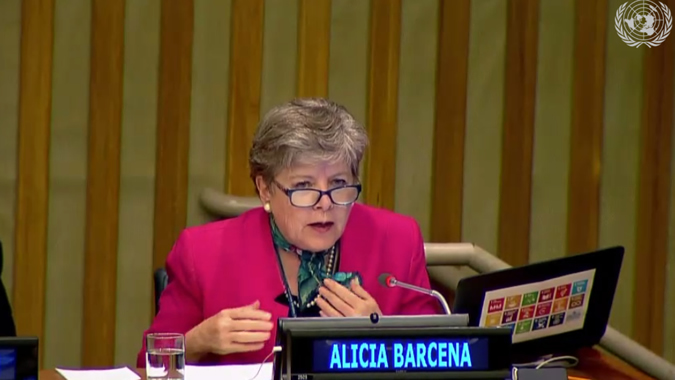Alicia Bárcena: The Simultaneous Implementation of Policies for Social and Labor Inclusion is Indispensable for Achieving Equality
Work area(s)
ECLAC’s Executive Secretary participated today in a dialogue among senior United Nations officials in the framework of the 57th session of the Commission for Social Development, being held in New York.

Universal policies on education, health and social protection contribute not only to inclusion but also to the strengthening of human capacities, increased productivity and economic growth, Alicia Bárcena, Executive Secretary of the Economic Commission for Latin America and the Caribbean (ECLAC), said today.
ECLAC’s highest authority participated, via videoconference, in a dialogue with other senior officials of the United Nations system in the framework of the 57th session of the Commission for Social Development, which is being held on February 11-21 in New York and which is focused this year on the priority theme of “Addressing inequalities and challenges to social inclusion through fiscal, wage and social protection policies.”
In addition to Alicia Bárcena, the speakers included Mounir Tabet, Acting Executive Secretary of the UN Economic and Social Commission for Western Asia (ESCWA); Kaveh Zahedi, Deputy Executive Secretary for Sustainable Development at the UN Economic and Social Commission for Asia and the Pacific (ESCAP); and Abdoulaye Mar Dieye, Assistant Administrator and Director of the Bureau for Policy and Programme Support at the United Nations Development Programme (UNDP). The discussion was moderated by Elliott Harris, UN Chief Economist and Assistant Secretary-General for Economic Development in the UN Department of Economic and Social Affairs (DESA).
The lead discussants were Vinicius Carvalho Pinheiro, International Labour Organization (ILO) Special Representative to the United Nations and Director; Paul Ladd, Director of the United Nations Research Institute for Social Development (UNRISD); and Ursula Wynhoven, International Telecommunication Union (ITU) Representative to the United Nations.
In her remarks, Bárcena said that social policy must be guided by the principle of universalism to build a welfare State, recognizing sensitivity to differences and oriented toward equal rights in order “to leave no one behind.”
She noted that, despite progress made by the region in terms of social spending, great challenges to financing social policies remain, especially in countries with higher poverty levels.
“The 2030 Agenda puts equality at the center. To advance on its fulfillment, social spending must be protected and strengthened,” Alicia Bárcena stated.
The senior United Nations official indicated that ECLAC has identified equality as an essential value of development and as a non-negotiable ethical principle, centered on a rights-based approach.
“Economic and social evidence shows that inequality is inefficient. On the contrary, equality is a prerequisite for achieving economic and social progress, for closing structural gaps and for achieving convergence with higher levels of productivity and decent jobs,” she affirmed.
Alicia Bárcena called for bolstering labor institutions and policies that promote decent employment and stressed that, to reduce poverty and achieve equality, it is imperative that the simultaneous implementation of policies for social and labor inclusion be strengthened.
She specified that in Latin America and the Caribbean, dual inclusion (social and labor) improved between 2002 and 2016. However, in 2016, just 23.5% of households found themselves in a situation of dual inclusion, while 45% suffered dual exclusion. She indicated that such gaps widen for the rural population, households headed by indigenous or Afro-descendant people, and persons with disabilities.
ECLAC’s top representative said that labor markets in the region exhibit high degrees of informality and major gaps in access to social protection, especially in the lowest income quintiles.
She added that the unemployment rate shows the intersection of the axes that structure social inequality in the region: despite their higher education levels and abilities, it is young people today who are the most affected by unemployment, a situation that is especially acute for young women.
For that reason, Bárcena said, it is urgent that effective and modern social protection systems be bolstered to prepare for new scenarios in the world of work and for uncertainties related to technology, and that social care and protection systems be strengthened to contribute to achieving gender parity and women’s economic autonomy.
Related content
Promoting Equality and Inclusion: A Latin American and Caribbean perspective
Presentation by ECLAC Executive Secretary, Alicia Bárcena, in the 57th Session of the Commission for Social Development.
57º periodo de sesiones de la Comisión de Desarrollo Social
Statement by Alicia Bárcena, Executive Secretary of ECLAC.
Country(ies)
- Latin America and the Caribbean